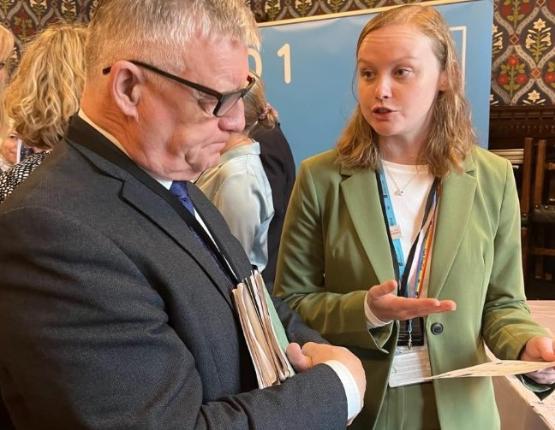Ofsted should reward schools for promoting physical exercise and diet, says report
A new report to MPs recommends broadening Ofsted’s role to ‘reward’ schools that provide enhanced physical activity and healthy nutrition options.

The report, commissioned by the Child of the North Initiative in partnership with the Centre for Young Lives, was led by academics at the University of Bradford, with contributions from the N8 research partnership and wider universities across the North of England.
It evidences poor diet and a lack of physical activity as key factors contributing to increasing levels of childhood obesity, which has knock on long-term impacts on wider physical and mental health challenges.
We need to better recognise those schools which are placing a greater importance on improving physical activity, healthier diets, and wellbeing by recognising their endeavours through the schools’ inspection system.
Dr Andy Daly-Smith, pictured above, Reader in Healthy Childhood at the University of Bradford and an executive editor of the report, said “A greater focus on physical activity in school is long overdue, as are the resources and specialist staff to deliver rich physical activity experiences. We need to better recognise those schools which are placing a greater importance on improving physical activity, healthier diets, and wellbeing by recognising their endeavours through the schools’ inspection system. Widening Ofsted’s remit to reward schools that follow such an approach would also encourage more schools to make this a priority for their students.”
It showcases a number of evidence-based projects that are already having a positive impact within schools and wider communities, including FUNMOVES (led by Dr Lucy Eddy at University of Bradford) which empowers schools to assess foundational motor skills which underpin physical activity behaviours, and support children to improve these skills within PE lessons, classroom movement breaks and at home.
In addition, it highlights the Creating Active Schools framework, developed by the University of Bradford and Yorkshire Sport Foundation as part of the Sport England local delivery Pilot. The Creating Active Schools programme has already been embraced by 250 schools nationally and is the subject of an international conference on while-school physical activity in Bradford in June.
Schools need to be empowered to and rewarded for supporting more holistic child development. The adoption of whole-school approaches... have the potential to have long-lasting impacts on education.

Dr Lucy Eddy, pictured above, an Executive Editor of the report, said: “The broader curriculum in schools emphasises the importance of wider health and wellbeing behaviours for later life chances. Schools need to be empowered to and rewarded for supporting more holistic child development. The adoption of whole-school approaches that are tailored to the needs of local communities, have the potential to have long-lasting impacts on education, health and wellbeing for the next generation and beyond.”
The report recommends three changes to current provision:
-
Whole-school approaches need to be established for physical activity and healthy nutrition, bringing together health and education to better support childhood health and well-being.
-
There needs to be a commitment to support education settings to deliver diverse curricula, teacher training and embed an ethos whereby the health and wellbeing of their pupils is central to teaching practices and the wider school environment.
-
Evidence-based practice and co-production should be prioritised to drive impactful and sustainable change within education settings.

Dr Eleanor Bryant, pictured above, an Executive Editor of the report said: “Children that receive adequate healthy nutrition are more able to engage with education as well as have better physical and mental health. This report highlights the benefits of universal approaches, including Free School Meals, and Breakfast Clubs. It also emphasises the importance of child voice in decision making around healthy nutrition in schools. We urgently need change to ensure children have the best possible chance to succeed within education settings.”
Wrong direction
A foreword to the report authored by Anne Longfield CBE, Executive Chair of the Centre for Young Lives and Dr Camilla Kingdon, Former President of the Royal College of Paediatrics and Child Health, says many children live “sedentary lives” and are exposed to “relentless advertising pressure… to eat unhealthy food”.
They add: “The trajectories of child physical activity and healthy diets are heading the wrong way, it is making it harder for children and young people to make healthy choices, and it is costing the UK billions a year, as well as holding back life chances. Current strategies are making too little difference. It’s time to superpower our schools and communities to help children and young people eat well, engage in physical activity, and be healthy.”
What the report says
The report says: “Millions of young people in the UK do not do the recommended 60-plus minutes of physical activity a day, and over 2 million 5-to-16-year-olds do not even get 30 minutes of activity per day.
“The Government’s Childhood Obesity Strategy, published in 2017, set out plans for schools to provide at least 30 minutes of moderate to vigorous physical activity a day through active break times, physical education, extracurricular clubs, active lessons, and other sport and physical activity events. However, children's physical activity levels show no signs of increasing and the nation’s health is suffering as a result.”
According to the report:-
-
Two in five children in every classroom have motor skill difficulties that negatively impact their ability to engage with physical activity
-
Only 1.6% of packed lunches meet the Government’s Food Standards
-
Almost four million children are not physically active for the recommended 60-plus minutes a day on average, according to Sport England (2022-23).
-
Physical inactivity costs the UK an estimated £7.4 billion each year (Everybody Active, Every Day governmental report).
-
2.2m five-16-year-olds do not get 30 mins of activity a day Sport England.
Creating Active Schools
The University of Bradford, Wolfson Centre for Applied Health Research, and Yorkshire Sport Foundation are hosting an international whole-school physical activity conference at the University on the 18th and 19th of June. For more information and tickets (booking closes 31st May), visit www.wspa2024.co.uk


